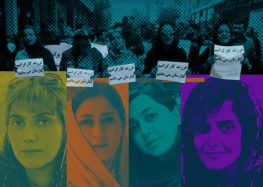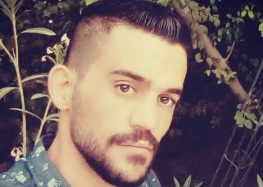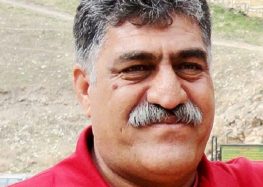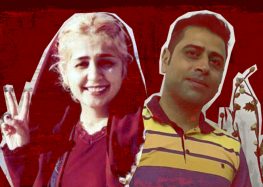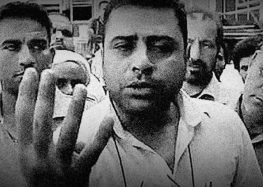Imprisoned Labor Activist With No Kidneys Hospitalized After Being Forced to Sleep on Cell Floor
 Imprisoned labor activist Mahmoud Salehi remains in intensive care three days after being rushed from a prison in Saqqez, in Iran’s Kurdistan Province, to a local hospital.
Imprisoned labor activist Mahmoud Salehi remains in intensive care three days after being rushed from a prison in Saqqez, in Iran’s Kurdistan Province, to a local hospital.
Salehi’s wife, Najibeh Salehzadeh, told the Center for Human Rights in Iran (CHRI) on November 6, 2017, that his doctors suspected he had experienced “mild heart failure.”
“He was first taken to the emergency section of the hospital, but his condition didn’t improve, so they called us on the phone and asked us to bring his medical records,” said Salehzadeh.
Salehi was hospitalized on November 3. In October 2017, his son, Samerand Salehi, informed CHRI that his father, who has no kidneys, was detained without receiving a summons to begin serving a one-year prison sentence issued by the Appeals Court in February 2017 for “propaganda against the state.”
“When they saw his medical history, the doctors said he probably had experienced mild heart failure and transferred him to intensive care to receive more attention,” she added.
Salehzadeh told CHRI that since his incarceration, Salehi has been sleeping on the floor of his cell.
“We took some clothes and blankets for him, but the prison officials [in Saqqez] refused to deliver them,” she said. “He was not given a bed, sufficient clothes or proper blankets, so he has been sleeping on the floor.”
A cellmate informed prison officials of Salehi’s life-threatening situation.
“One of his cellmates informed the prison staff after noticing Mahmoud’s irregular breathing and choking signs at 2 a.m.,” said Salehzadeh. “If his cellmate wasn’t awake at the time, who knows what terrible thing could have happened?”
“I called Mahmoud on Thursday [November 3] and found out that he had caught a cold from sleeping on the floor,” she continued. “The authorities all know about his dangerous condition. Isn’t it obvious they want him to get worse so that something will happen to him?”
Security agents interrupted Salehi’s weekly dialysis treatment on October 28, 2017, to transport him to the prison to begin serving a one-year sentence issued by the Appeals Court in February 2017 for “propaganda against the state.”
In September 2015, Branch 1 of the Revolutionary Court in Sanandaj sentenced Salehi to nine years in prison for “propaganda against the state” and “creating an opposition group.”
He lost both his kidneys that year after his medications were cut off by prison authorities in a prison in Sanandaj, the capital of Kurdistan Province.
Salehi is a co-founder of the Labor Unions Coordination Committee.
Independent unions are not allowed to operate in Iran, strikers often lose their jobs and risk arrest, and labor leaders who attempt to organize workers and bargain collectively are prosecuted under national security charges and sentenced to long prison sentences.
“After he lost his kidneys, he developed other problems,” Salehzadeh told CHRI. “He has diabetes and heart problems and takes several different pills. We provided medical documents that show he needs dialysis treatment twice a week.”
“The doctors have also recommended that he undergo heart surgery,” she said. “Everyone knows that even a minute in prison is too dangerous for Mahmoud, but no one cares.”
In 2016 Salehzadeh was herself put on trial at Branch 1 of the Revolutionary Court in Saqqez for allegedly posting “insulting” material on Facebook. A verdict has not been issued.
A 45-year-old baker based in Saqqez, Salehi was previously arrested several times for his peaceful pro-labor activities.
His latest arrest, by agents of the Intelligence Ministry, took place in April 2015 ahead of International Labor Day, May 1, in Sanandaj. A month later he was hospitalized for serious urinary complications and eventually both of his kidneys were removed.
After his release from detention on medical grounds in November 2015, Mahmoud Salehi wrote an open letter to the UN special rapporteur on the human rights situation in Iran describing his experience.
“I was arrested on April 28, 2015, by plainclothes Intelligence Ministry agents in my home without committing any act against the Constitution,” wrote Salehi.
“After my arrest and transfer to solitary confinement in prison in Saqqez, I was taken to the Intelligence Ministry’s notorious detention center [in Sanandaj] along with [labor activist] Osman Esmaili, who was arrested the same day,” he said.
“I lost both of my kidneys there because the prison authorities cut off my medications,” wrote Salehi. “Now I receive dialysis treatment every Saturday and Tuesday at the Imam Khomeini Hospital in Saqqez.”


